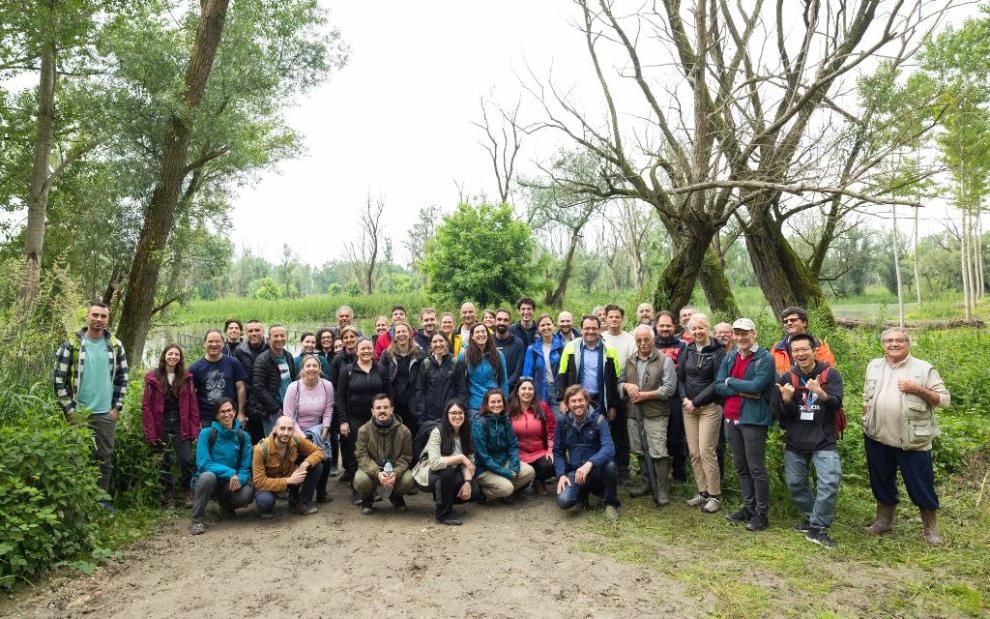REWET partners met in Parma for their periodical meeting. Discover more.

The REWET project, funded by the European Union under the Horizon Europe programme, focuses on restoring peatlands and wetlands across Europe.
The consortium of partners regularly convenes to review the latest progress and address any delays that may have arisen.
The meeting was in Parma from 15 to 17 of May 2024 and was hosted by the University of Parma and ADBPO.
The meeting began with a warm welcome from ADBPO. Following the welcome words, IDE provided an overview of the meeting agenda and then took the stage to discuss project management under Work Package 1 (WP1). They provided a comprehensive update on the project's progress, outlining the milestones achieved and the plans for the upcoming phases.
KNEIA followed with a presentation on results on Communication and Dissemination, followed by a short but effective workshop on exploitation in the REWET project with the objective of enhancing the project's reach and impact.
The focus then shifted to the status of wetlands across Europe. IDE and Wetlands International provided a detailed mapping of wetland status, highlighting both the challenges and opportunities for restoration. This session underscored the need for accurate data and mapping to inform effective conservation strategies.
After a brief coffee break, the meeting resumed with a session on Modelling (WP4) led by FIC and IDE. This presentation delved into the technical aspects of ecological modelling, showcasing how models can predict the outcomes of various restoration strategies. The insights from this session were crucial for planning and implementing effective restoration measures.
The next discussion focused on enabling policies, presented by IUCN-NL and BAX. They explored the policy frameworks necessary to support wetland restoration efforts. The presenters highlighted successful policy interventions and identified gaps that need to be addressed to facilitate large-scale restoration projects. IDE and BAX then returned to discuss Replication and Business Models under Work Package 6 (WP6). This session explored the economic aspects of wetland restoration, emphasizing the importance of developing sustainable business models that can be replicated across different regions.
Following a lunch break, the focus shifted to Open Labs and Monitoring under Work Package 2 (WP2). Representatives from various countries shared updates on their respective Open Labs. WEnR discussed the Netherlands, BOKU presented Austria, UEF and UOULU covered Finland, UT shared insights from Estonia, WI-EA and Stroming provided an overview of Belgium, ABPO discussed Italy, and UEVORA presented Portugal. Each presentation highlighted the unique challenges and successes of their Open Labs, providing a comprehensive view of the project's diverse approaches to wetland restoration.
The session continued with a social assessment on Open Labs by KULeuven. This discussion emphasized the social dimensions of wetland restoration, highlighting the importance of community engagement and participatory approaches in ensuring the success of restoration projects.
The day concluded with a participatory wrap-up session led by IDE, where all attendees reflected on the day's discussions and identified key takeaways. This collaborative session fostered a sense of shared purpose and commitment to the project's goals.
The second day featured a visit to Open Lab #6 in Gussola. Participants departed from Parma and travelled to the site, where they engaged in a walking tour. Informal presentations covered aspects related to local vegetation, fish diversity, and water and sediment chemistry. The visit provided a hands-on understanding of the interventions to increase the frequency of floods and their impact on the ecosystem. An informal lunch at the Gussola Open Lab allowed for continued discussions, followed by interviews with local stakeholders. These interactions provided valuable insights into local perspectives on river restoration strategies.
The final day began with presentations on the broader implications of the pilot actions at Open Lab #6. ADBPO discussed the integration of these actions into a larger Po River basin management strategy, while UNIPR provided a research perspective on watershed restoration priorities. A general discussion session followed, focusing on the local and big-picture relevance of the scale at Open Lab #6 and other REWET Open Labs. This session allowed participants to synthesize their insights and align on future directions. The meeting concluded with various working group activities, including workshops on flux calculation, soil and water analyses, and ecological modelling. These workshops provided practical skills and knowledge to support the ongoing restoration efforts.
Overall, the REWET project meeting was a success, fostering collaboration, sharing knowledge, and advancing the collective efforts towards restoring Europe's vital peatlands and wetlands.